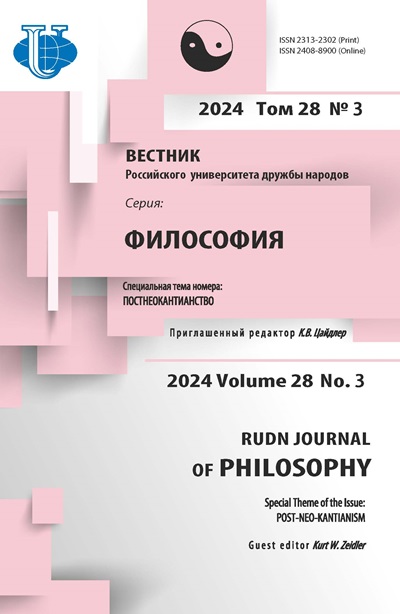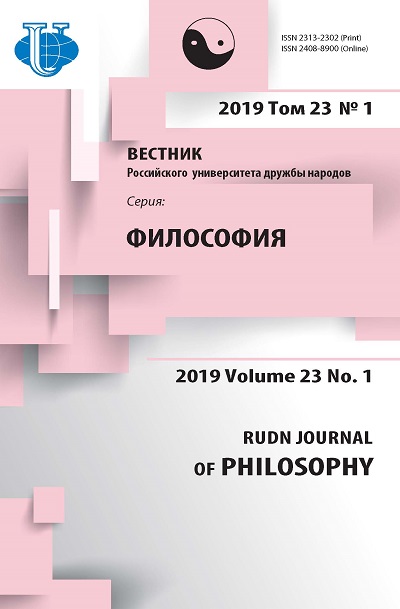REFERENCES OF PROPER NAMES AS THE PROBLEM OF CONTEMPORARY PHILOSOPHY OF LANGUAGE
- Authors: Cherniak AZ1
-
Affiliations:
- Peoples’ Friendship University of Russia (RUDN University)
- Issue: Vol 23, No 1 (2019)
- Pages: 56-65
- Section: SOCIAL PHILOSOPHY: LANGUAGE-MAN-SOCIETY
- URL: https://journals.rudn.ru/philosophy/article/view/20949
- DOI: https://doi.org/10.22363/2313-2302-2019-23-1-56-65
Cite item
Full Text
Abstract
This article investigates the idea that meanings of proper names are their references which is popular in the philosophy of language. The aim is to show, first, that there is no satisfactory answer to the question “How references as stable relations between words and objects appear, due to accomplishment of what conditions these properties of linguistic expressions may be produced?”, and, second, that we can still use the notion of reference in our explanations of some effects of communication if we treat reference as pragmatic rather than semantic phenomenon. The actuality of this research is provided by the fact that the identification of meanings of certain types of terms, proper names first of all, with their references is still very influential account in the philosophy of language. The author uses the methods of historical exposition and philosophical analysis of the main theories of reference, such as theory of descriptions and causal theory of reference. It is shown that these theories in their different modifications fail to explain how references as semantic relations between proper names and their bearers may be produced in the course of communication and social interaction. But although there are alternative concepts of the nature meanings of proper names it is concluded that we still may apply the notion of reference in our explanations of natural language communication if we treat reference as pragmatic effect caused by mutual coordination of actions achieved by the participants of certain communicative situation.
About the authors
A Z Cherniak
Peoples’ Friendship University of Russia (RUDN University)
Email: abishot2100@yandex.ru
- Miklukho-Maklaya Str., 6 Moscow, Russian Federation 117198
References
- Aristotle. On Interpretation (De Interpretatione). Clarendon Aristotle Series, Oxford: Oxford University Press; 1963.
- St. Augustine. The Confessions of St. Augustine. New York: Image Books; 1960.
- Lewis C.I. The Modes of Meaning. Philosophy and Phenomenological Research. 1943; 4(2): 236-250.
- Frege G. On sense and Meaning. Translations from the Philosophical Writings of Gottlob Frege, Geach P.T., Black M. (eds.) Oxford: Blackwell, 1952.
- Quine, W.V.O. Word and Object. Harvard University Press; 1960.
- Locke J. An Essay Concerning Human Understanding. The Pennsylvania State University, Electronic Classics Series, Manis J. (ed.), Hazleton, PA 18201-1291; 1999.
- Russell BAW. On Denoting. Mind. 1905; 14: 479-93.
- Kripke S. Naming and Necessity. Cambridge: Harvard University Press; 1980.
- Russell BAW. The Problems of Philosophy. Oxford: Oxford University Press; 1974.
- Strawson PF. Individuals: An Essay on Descriptive Metaphysics. London: Methuen; 1959.
- Katz JJ. Has the Description Theory of Names been Refuted? Meaning and Method, Boolos G. (ed.). Cambridge: Cambridge University Press, 1990. P. 31-61.
- Geurtz B. Good News about the Description Theory of Names. Journal of Semantics. 1997; 14: 319-48.
- Mill DS. A System of Logic. V. I. London: Parker, Son, and Bourn; 1862.
- Donnellan K. Reference and Definite Descriptions. Philosophical Review. 1966; 77: 281-304.
- Devitt M., Sterelny K. Language and Reality: An Introduction to the Philosophy of Language. Blackwell Publishers; 1999.
- McGilvray J. Meanings Are Syntactically Individuated and Found in the Head. Mind and Language. 1998; 13: 225-280.
- Chomsky N. New Horizons in the Study of Language and Mind. Cambridge: Cambridge University Press; 2000.
- Sellars W. In the Space of Reasons. Scharp K., Brandom R. (eds.), Cambridge, Massachusetts: Harvard University Press; 2007.
- Brandom R. Articulating Reasons: an Introduction to Inferentialism. Harvard University Press: Cambridge, Massachusetts, London; 2000.
- Field H. Logic, Meaning and Conceptual Role. Journal of Philosophy. 1977; 69: 379-408.
- Harman G. (Non-Solipsistic) Conceptual Role Semantics. Harman G. Reasoning, Meaning, and Mind. Oxford: Clarendon.
















